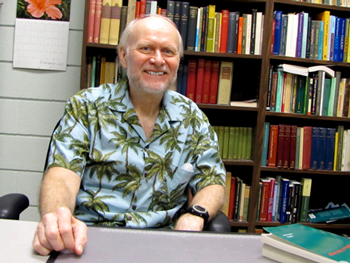News and Events
Philosophy conference grapples with the right questions

Philosophy professor Greg Brown is chief organizer of the Fourth Annual Conference of the Leibniz Society of North America on Dec. 3-5.
Gottfried Wilhelm Leibniz, the 17th century German theologian, philosopher and mathematician, was Sir Isaac Newton's chief rival.
Both men are credited with discovering calculus, but they weren't cooperative collaborators.
"Leibniz got into a very bitter dispute with Newton over the discovery of calculus," said philosophy professor Greg Brown. "Newton actually accused him of plagiarizing it."
That rift was "world-shaking," Brown continued. "Newton and Leibniz were the two greatest figures of that period. And Newton, of course, was the national symbol of Great Britain."
Although Leibniz' name is not taught in elementary school as Newton's is, his philosophical and scientific contributions continue to be debated and mined for practical applications today.
The Department of Philosophy hosts Dec. 3 -5 the Fourth Annual Conference of the Leibniz Society of America.
The Leibniz Society is comprised of philosophy researchers and professors interested in the life and writings of one of the greatest geniuses in Western intellectual life.
The society used to meet for its annual conference during the American Philosophical Association's Eastern Division conference. Four years ago, the society started meeting independently and rotating the conference between its members' campuses.
The first year, the conference was held at Rice University in Houston, the second one at Princeton University in New Jersey, the third at the University of Kentucky in Lexington.
This semester Brown is teaching a graduate-level seminar about the dispute between Leibniz and Newton, which culminated in what Brown said is one of the most influential philosophical correspondences — namely, the correspondence between Leibniz and the Newtonian philosopher and theologian, Samuel Clarke.
The one full-length book Leibniz published in his lifetime was Théodicée, which Brown said served as his response to skepticism about the justice of God. The criticism that Leibniz addressed was that it is impossible to reconcile the evil found in the world with the existence of a deity supposed to be omnipotent, omniscient and perfectly good.
"Leibniz argued that this world is the best of all possible worlds," Brown said. "He imagined that God had in His mind the ideas of all possible worlds that he might create and that he compared them in respect to their goodness. When He finished his comparison, this one turned out to be the best."
But does Brown agree with Leibniz's optimism?
"It's a kind of beautiful thought," Brown said. "There's a lot of stuff in Leibniz that I don't personally subscribe to, but that's not why we study great figures in philosophy. The mark of a really great philosopher is not necessarily determined by him getting the right answer to a question, it's really determined by how profound of a question he tried to ask."
For more information about the Department of Philosophy, visit their website at http://www.philosophy.uh.edu.
—Brandon Moeller